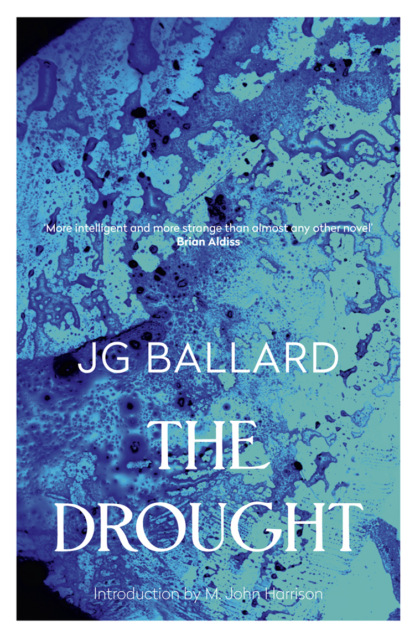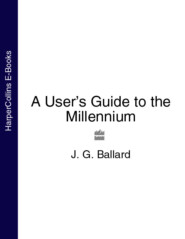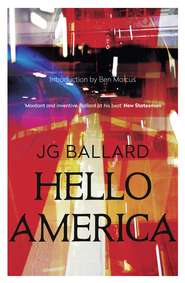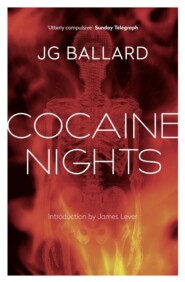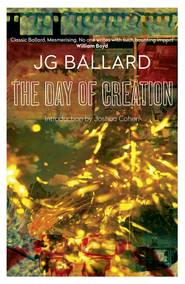По всем вопросам обращайтесь на: info@litportal.ru
(©) 2003-2024.
✖
The Drought
Настройки чтения
Размер шрифта
Высота строк
Поля
Ransom could see her now, beaked nose flashing to left and right like an irritable parrot's as she flicked at her dark face with a Chinese fan, indifferent to the heat and the river's stench. She had been sitting in the same place when he set off in the houseboat, her ribald shouts egging on the week-end mariners laying a line of cement-filled bags across the entrance to the yacht basin. Even at flood barely enough water entered the harbour to irrigate its narrow docks, and this had now leaked back into the river, settling the smartly decked craft into their own mud. Deserted by their owners, the yachts were presided over by Mrs Quilter's witch-like presence.
Despite her grotesque appearance and insane son, Ransom admired this old woman of the barges. Often during the winter he crossed the rotting gangway into the gloomy interior of the barge, where she lay on a feather mattress tied to the chart table, wheezing to herself. The single cabin, filled with dusty lanterns, was a maze of filthy recesses veiled by old lace shawls. After filling her tea-pot from the flask of gin in his valise, Ransom would be rowed back across the river in her son's leaking coracle, Quilter's great eyes below the hydrocephalic forehead staring at him through the rain like wild moons.
Rain! – at the recollection of what the term had once meant, Ransom looked up at the sky. Unmasked by clouds or vapour, the sun hung over his head like an ever-attendant genie. The fields and roads adjoining the river were covered with the same unvarying light, a glazed yellow canopy that embalmed everything in its heat.
Below the jetty Ransom had staked a line of coloured poles into the water, but the rapid fall in the level needed little calculation. In the previous three months the river had dropped some twenty feet, shrinking to less than a quarter of its original volume. As it sank, it seemed to pull everything towards it. The banks were now opposing cliffs, topped by the inverted tents suspended from the chimneys of the riverside houses. Originally designed as rain-traps – though no rain had ever fallen into them – the canvas envelopes had been transformed into a line of aerial garbage scoops, the bowls of dust and leaves raised like offerings to the sun.
Ransom crossed the deck and stepped down into the steering well. He waved to Quilter, who was watching him with a drifting smile. Behind him, along the deserted wharfs, the bodies of the drying fish turned slowly in the air.
‘Tell your mother to move the barge,’ Ransom called across the interval of slack water. ‘The river is still falling.’
Quilter ignored this. He pointed to the blurred forms moving slowly below the surface.
‘Clouds,’ he said.
‘What?’
‘Clouds,’ Quilter repeated. ‘Full of water, doctor.’
Ransom stepped through the hatchway into the cabin of the houseboat, smiling to himself at Quilter's bizarre humour. Despite his deformed skull and Caliban-like appearance, there was nothing stupid about Quilter. The dreamy, ironic smile, at times almost affectionate in its lingering glance, as if understanding Ransom's most intimate secrets, the seamed skull with its russet hair and the inverted planes of the face, in which the cheekbones were set back two or three inches, leaving deep hollows below the eyes – all these and a streak of unpredictable naivety made Quilter a daunting figure. Most people wisely left him alone, possibly because his invariable method of dealing with them was to pick unerringly on their weaknesses and work away at these like an inquisitor
It was this instinct for failure, Ransom decided with wry amusement as Quilter watched him from his vantage point above the dead birds, that probably explained Quilter's persistent curiosity in his own case. For some time now Quilter had followed him around, no doubt assuming that Ransom's solitary week-ends among the marshes along the southern shore of the lake marked a reluctance to face up to certain failures in his life – principally, Ransom's estrangement from his wife Judith. However, Quilter's attempts to exploit this situation and provoke Ransom in various minor ways – by stealing the deck equipment from the houseboat, and disconnecting the power lines down the bank – had so far been unsuccessful in upsetting Ransom's tolerant good humour.
Quilter, of course, had been unable to grasp that the failure of Ransom's marriage was less a personal one than that of its urban context, in fact a failure of landscape, and that with his discovery of the river Ransom had at last found an environment in which he felt completely at home, a zone of identity in space and time. Quilter would have had little idea of the extent to which Ransom shared that sense of the community of the river, the unseen links between the people living on the margins of the channel, which for Ransom had begun to take the place of his marriage and his work at the hospital. All this had now been ended by the drought
Throughout the long summer Ransom had watched the river shrinking, its countless associations fading as it narrowed into a shallow creek. Above all, Ransom was aware that the role of the river in time had changed. Once it had played the part of an immense fluid clock, the objects immersed in it taking up their positions like the stations of the sun and planets. The continued lateral movements of the river, its rise and fall and the varying pressures on the hull, were like the activity within a vast system of evolution, whose cumulative forward flow was as irrelevant and without meaning as the apparently linear motion of time itself The real movements were those random and discontinuous relationships between the objects within it those of himself and Mrs Quilter her son and the dead birds and fish
With the death of the river, so would vanish any contact between those stranded on the drained floor. For the present the need to find some other measure of their relationships would be concealed by the problems of their own physical survival. None the less, Ransom was certain that the absence of this great moderator, which cast its bridges between all animate and inanimate objects alike, would prove of crucial importance. Each of them would soon literally be an island in an archipelago drained of time.
2 Mementoes (#ud8b4cf75-257c-5a37-b2c5-492d8ad3b612)
Helping himself to what was left of the whisky in the galley cabinet, Ransom sat down on the edge of the sink and began to scrape away the tar stains on his cotton trousers. Within the next hour he would have to go ashore, leaving the houseboat for the last time, but after a week on board he felt uneager to leave the craft and make all the social and mental readjustments necessary, minimal though these would now be. He had let his beard grow, and the rim of fair hair had been bleached almost white by the sunlight. This and his bare, sunburnt chest gave him the appearance of a seafaring Nordic anthropologist, standing with one hand on his mast, the other on his Malinowski. Although he gladly accepted this new persona, Ransom realized that it was still only notional, and that his real Odyssey lay before him, in the journey by land to the coast.
None the less, however much the role of single-handed yachtsman might be a pleasant masquerade, the houseboat seemed to have been his true home for longer than the few months he had owned it. He had seen the craft for sale the previous winter, while visiting a patient in the yacht basin, and bought it almost without thinking, on one of those gratuitous impulses he often used to let a fresh dimension into his life. To the surprise of the other yachtsmen, Ransom towed the craft away and moored it on the exposed bank below the motor-bridge. The mooring was a poor one at a nominal rent, the stench of the fish-quays drifting across the water, but the slip road near by gave him quick access to Hamilton and the hospital. The only hazards were the cigarette ends thrown down from the cars crossing the bridge. At night he would sit back in the steering well and watch the glowing parabolas extinguish themselves in the water around him.
Looking at the contents of the cabin as he sipped his drink, Ransom debated which of his possessions to take with him. The cabin had become, unintentionally, a repository of all the talismans of his life. On the bookself were the anatomy texts he had used in the dissecting room as a student, the pages stained with the formalin that leaked from the corpses on the tables, somewhere among them the unknown face of his surgeon father. On the desk by the stern window was the limestone paperweight he had cut from a chalk cliff as a child, the fossil shells embedded in its surface bearing a quantum of Jurassic time like a jewel. Behind it, the ark of his covenant, stood two photographs in a hinged blackwood frame. On the left was a snapshot of himself at the age of four, sitting on a lawn between his parents before their divorce. On the right, exorcizing this memory, was a faded reproduction of a small painting he had clipped from a magazine, ‘Jours de Lenteur’ by Yves Tanguy. With its smooth, pebble-like objects, drained of all associations, suspended on a washed tidal floor, this painting had helped to free him from the tiresome repetitions of everyday life. The rounded milky forms were isolated on their ocean bed like the houseboat on the exposed bank of the river.
Ransom picked up the frame and looked at the photograph of himself. Although he recognized the small, square-jawed face of the child on the lawn, there now seemed an absolute break of continuity between the two of them. The past had slipped away, leaving behind it, like the debris of a vanished glacier, a moraine of unrelated mementoes, the blunted nodes of the memories that now surrounded him in the houseboat. The craft was as much a capsule protecting him against the pressures and vacuums of time as the steel shell of an astronaut's vehicle guarded the pilot from the vagaries of space. Here his half-conscious memories of childhood and the past had been isolated and quantified, like the fragments of archaic minerals sealed behind glass cases in museums of geology.
3 The Fishermen (#ulink_38739b17-45b1-530c-b8d2-86c1cd49f61d)
A siren hooted warningly. A river steamer with a single high funnel, white awnings flared over the rows of empty seats, approached the central passage between the main pylons of the bridge. Captain Tulloch, a bottle-nosed old buff, sat above the helmsman on the roof of the wheel-house, staring myopically down the narrowing channel. With its shallow draught, the steamer could glide over submerged banks barely two feet below the surface. Ransom suspected that Tulloch was now half-blind, and that his pointless passages in the empty steamer, which once carried sightseers across the lake, would go on until the craft ran immovably aground on a mud-bank.
As the steamer passed, Quilter stepped down into the water, and with an agile leap swung himself on to the hand-rail, feet in the scuppers.
‘Full ahead there!’ With a cry, Captain Tulloch hopped from his perch. He seized a boat-hook and hobbled down the deck towards Quilter, who grimaced at him from his hand-hold on the stern rail. Bellowing at the youth, who scuttled like a chimpanzee on its bars, Tulloch rattled the boat-hook up and down between the rails. They passed below the bridge and approached the Quilters' barge. Mrs Quilter, still fanning herself, sat up and hurled a series of vigorous epithets at the captain. Ignoring her, Tulloch drove Quilter along the rail, lunging at him like a perspiring pikeman. The helmsman swung the steamer hard by the barge, trying to rock it from its mooring. As it passed, Mrs Quilter jerked loose the line of the coracle. It bounced off the bows of the steamer, then raced like a frantic wheel between the hulls. Quilter leapt nimbly into it from the rail and was spreadeagled on the barge's deck as Captain Tulloch swung the boat-hook at his head, knocking Mrs Quilter's fan from her hand into the water.
The hot sunlight spangled in the steamer's wake as Mrs Quilter's laughter faded across it. Glad to see the old woman in such good spirits, Ransom waved to her from the deck of the houseboat, but she had followed Quilter through the hatchway. Settling itself, the river stirred slowly, now and then breaking into oily swells. Its white banks were beginning to crack like dry cement, and the shadows of the dead trees formed brittle ciphers on the slopes. Overhead a car moved along the deserted motor-bridge, heading towards the coast.
Ransom stepped out on to the jetty to inspect his rain-gauge. As he emptied the dust from the cylinder, a woman in a white beach-robe made her way down the bank fifty yards from him. She walked with the unhurried step of someone who has recovered from a long malady and feels that all the time in the world lies before her. The crumbling surface of the bank rose into the air like clouds of bone-meal. She looked down with preoccupied eyes at the thin stream of water. As she lifted her head to the sky her solitary figure seemed to Ransom like the spectre of the renascent dust.
Her strong face turned its level gaze upon Ransom, unsurprised to find him standing on the bed of the empty river. Although he had not seen her for some weeks, Ransom, conversely, knew that she would be among the last people to remain in the abandoned town. Since the death of her father, the former curator of the zoo at Mount Royal, Catherine Austen had lived alone in the house by the river. Often Ransom saw her walking along the bank in the evening, remote sister of the lions, her long red hair reflected in the liquid colours of the water at sunset. Sometimes he called to her as he sailed past in the houseboat, but she never bothered to reply.
She knelt down by the water's edge, frowning at the dead fish and birds that drifted past. She stood up and walked across to Ransom's jetty.
She pointed to an old bucket hanging from the wooden housing of the rain-gauge. ‘May I borrow that?’
Ransom handed it to her, then watched as she tried to fill it from the edge of the gangway. ‘Haven't you any water left?’
‘A little to drink. It's so hot, I wanted to bathe.’ She lifted the bucket from the water, then decanted the dark fluid carefully into the river. The inside of the bucket was cloaked by an oily veil. Without turning, she said, ‘I thought you'd gone, doctor, with everyone else, to the coast.’
Ransom shook his head. ‘I've just spent a week sailing on the lake.’ He pointed to the mud-flats that stretched away beyond the entrance to the river, the moisture beading on their wet slopes. ‘You'll be able to walk across it soon. Are you going to stay on here?’
‘Perhaps.’ She watched a fishing boat enter the river and approach them, its motor beating slowly. Two men stood in the bows, scanning the deserted wharfs. A crude black awning covered the stern of the boat, where three more men sat around the tiller, their pinched faces looking across the water at Ransom, and Catherine Austen. The craft's empty nets lay amidships, but the sides of the boat had been ornamented in a way Ransom had not seen before. A large carp, slit down its belly, had been fastened to each of the rowlocks, and then turned outwards to face the water. The silver bodies of the six fish stood upright on both sides of the boat like sentinels. Ransom assumed that the boat and its crew came from one of the settlements among the marshes, and that with the drought and the end of the lake the small colonies were being drawn towards the river and Mount Royal.
Yet the significance of the mounted fish eluded him. Most of the fishermen from the marshes lived close to nature, and the carp were probably some kind of rudimentary totem, expressing the fishermen's faith in their own existence.
Catherine Austen touched his arm. ‘Look at their faces.’ With a smile she whispered: ‘They think you're to blame.’
‘For the lake?’ Ransom shrugged. ‘I dare say.’ He watched the boat disappear below the bridge. ‘Poor devils, I hope they find better catches at sea.’
‘They won't leave here. Didn't you see the fish?’ Catherine strolled to the end of the jetty, the white gown sweeping from her hips to the dusty boards. ‘It's an interesting period – nothing moves, but so much is happening.’
‘Too much. There's barely enough time to hunt for water.’
‘Don't be prosaic. Water is the least of our problems.’ She added: ‘I take it you'll be here?’
‘Why do you say that?’ Ransom waited as a truck towing a large trailer crossed the bridge. ‘As a matter of fact, I intend to leave in a day or two.’
Catherine gazed out at the exposed lake-bed. ‘It's almost dry. Don't you feel, doctor, that everything is being drained away, all the memories and stale sentiments?’
For some reason this question, with its ironic emphasis, surprised Ransom. He looked down at the sharp eyes that watched his own. Catherine's banter seemed to conceal a complete understanding of his own thoughts. With a laugh, he raised his hands as if to fend her off. ‘Do I take that as a warning? Perhaps I should change my mooring?’
‘Not at all, doctor,’ Catherine said blandly. ‘I need you here.’ She handed him the bucket. ‘Have you any water to spare?’
Ransom slipped his hands into his trousers. The endless obsession with water during the previous months had forged powerful reflexes. Glad to be able to rely on them for once, he shook his head. ‘I haven't. Or is that an appeal to sentiment?’
Catherine waited, and then turned away. Fastening her robe, she bent down and filled the bucket.
Ransom took her arm. He pointed to the slip road leading down from the embankment. Directly below the bridge the trailer had parked, and the families of four or five adults and half a dozen children were setting up a small camp. Two of the men carried a chemical closet out of the trailer. Followed by the children, they walked down the bank, sinking up to their knees in the white dust. When they reached the water they emptied the closet and washed it out.
‘For God's sake … !’ Catherine Austen searched the sky. ‘Doctor, people are filthy.’
Ransom took the half-filled bucket from her and lowered it into the water. Catherine watched it glide away on the oily current, her face pale and expressionless. Professor Austen's wife, a noted zoologist in her own right, had died in Africa while Catherine was a child. Watching her, Ransom reflected that however isolated a man might be, women at least remained his companions, but an isolated woman was isolated absolutely.
Gathering her robe, Catherine began to make her way up the bank.
‘Wait,’ Ransom called. ‘I'll lend you some water.’ With forced humour, he added: ‘You can repay me when the pressure comes on again.’





